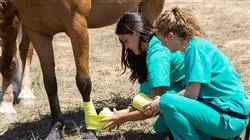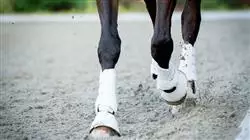University certificate
The world's largest faculty of veterinary medicine”
Introduction to the Program
Veterinarians should undertake continuous professional development to enhance their assessments and diagnoses for equine rehabilitation"

The Postgraduate diploma in Functional Assessment and Diagnosis Oriented to Equine Rehabilitation approaches this discipline through the experience of several internationally renowned rehabilitation specialists, as well as overarching scientific analysis of physiotherapy and rehabilitation, including information that cannot be found in any other online or classroom program, delivered by a faculty of the highest level.}
The field of Functional Assessment and Diagnosis Oriented to Equine Rehabilitation has seen enormous growth in recent years, and represents a clinical speciality widely demanded by owners, riders and professionals in the equestrian field. One of its main pillars is the exhaustive and meticulous knowledge of the horse's anatomy, both from the functional point of view as well as its biomechanical behavior.
The movement of the horse is developed fundamentally in three gaits: walk, trot and canter. However, as with human sports, each equestrian discipline requires specific biomechanics and therefore has specific locomotor requirements. Understanding this facilitates the recognition of appropriate movement patterns or, on the contrary, possible limiters of sports performance. All this has very important implications for the clinical interpretation of numerous pathologies of the musculoskeletal apparatus of the horse.
Thus, this program covers the fundamentals to perform a complete functional examination of the horse, so that a concise list of issues and treatment objectives can be drawn up, which in turn will allow the design of an individualized therapeutic plan.
During the course of this program, neurological, orthopedic or pain assessment methods, essential for the effective veterinary physiotherapist's toolbox, will be demonstrated.
Besides this, there will also be an update on the diagnostic imaging tools currently used in the field of musculoskeletal pathology. Effective treatment and rehabilitation of pathologies requires an accurate diagnosis. For this, a detailed anamnesis, clinical examination, use of the correct diagnostic tools and, finally, the application of a treatment aimed at the horse's sporting recovery must be carried out.
Do not miss the opportunity to take this Postgraduate diploma in Functional Assessment and Diagnosis Oriented to Equine Rehabilitation with us. It's the perfect opportunity to advance your career"
This Postgraduate diploma in Functional Assessment and Diagnosis Oriented to Equine Rehabilitation contains the most complete and up-to-date scientific program on the market. The most important features include:
- The exploration of practical cases presented by experts in equine physiotherapy and rehabilitation
- Graphic, schematic, and practical contents which provide scientific and practical information on the disciplines that are essential for professional practice
- Practical exercises where self-assessment can be used to improve learning
- Special emphasis on innovative methodologies in functional assessment and diagnosis for equine rehabilitation
- Theoretical lessons, questions to the expert, debate forums on controversial topics, and individual reflection assignments
- Content that is accessible from any fixed or portable device with an Internet connection
This Postgraduate diploma is the best investment you can make in selecting a refresher program to update your knowledge in Functional Assessment and Diagnosis Oriented to Equine Rehabilitation"
Its teaching staff includes veterinary professionals, who bring their professional experience to this program, as well as recognised specialists from leading societies and prestigious universities.
The multimedia content, developed with the latest educational technology, will provide the professional with situated and contextual learning, i.e., a simulated environment that will provide immersive education programmed to learn in real situations.
This program is designed around Problem-Based Learning, whereby the professional must try to solve the different professional practice situations that arise throughout the program. For this purpose, the professional will be assisted by an innovative interactive video system developed by renowned experts in Functional Assessment and Diagnosis Oriented to Equine Rehabilitation, with extensive experience.
This program comes with the best educational material, providing you with a contextual approach that will facilitate your learning"

This 100% online Postgraduate diploma will allow you to combine your studies with your professional work while expanding your knowledge in this field"
Why study at TECH?
TECH is the world’s largest online university. With an impressive catalog of more than 14,000 university programs available in 11 languages, it is positioned as a leader in employability, with a 99% job placement rate. In addition, it relies on an enormous faculty of more than 6,000 professors of the highest international renown.

Study at the world's largest online university and guarantee your professional success. The future starts at TECH”
The world’s best online university according to FORBES
The prestigious Forbes magazine, specialized in business and finance, has highlighted TECH as “the world's best online university” This is what they have recently stated in an article in their digital edition in which they echo the success story of this institution, “thanks to the academic offer it provides, the selection of its teaching staff, and an innovative learning method aimed at educating the professionals of the future”
A revolutionary study method, a cutting-edge faculty and a practical focus: the key to TECH's success.
The most complete study plans on the university scene
TECH offers the most complete study plans on the university scene, with syllabuses that cover fundamental concepts and, at the same time, the main scientific advances in their specific scientific areas. In addition, these programs are continuously being updated to guarantee students the academic vanguard and the most in-demand professional skills. In this way, the university's qualifications provide its graduates with a significant advantage to propel their careers to success.
TECH offers the most comprehensive and intensive study plans on the current university scene.
A world-class teaching staff
TECH's teaching staff is made up of more than 6,000 professors with the highest international recognition. Professors, researchers and top executives of multinational companies, including Isaiah Covington, performance coach of the Boston Celtics; Magda Romanska, principal investigator at Harvard MetaLAB; Ignacio Wistumba, chairman of the department of translational molecular pathology at MD Anderson Cancer Center; and D.W. Pine, creative director of TIME magazine, among others.
Internationally renowned experts, specialized in different branches of Health, Technology, Communication and Business, form part of the TECH faculty.
A unique learning method
TECH is the first university to use Relearning in all its programs. It is the best online learning methodology, accredited with international teaching quality certifications, provided by prestigious educational agencies. In addition, this disruptive educational model is complemented with the “Case Method”, thereby setting up a unique online teaching strategy. Innovative teaching resources are also implemented, including detailed videos, infographics and interactive summaries.
TECH combines Relearning and the Case Method in all its university programs to guarantee excellent theoretical and practical learning, studying whenever and wherever you want.
The world's largest online university
TECH is the world’s largest online university. We are the largest educational institution, with the best and widest online educational catalog, one hundred percent online and covering the vast majority of areas of knowledge. We offer a large selection of our own degrees and accredited online undergraduate and postgraduate degrees. In total, more than 14,000 university degrees, in eleven different languages, make us the largest educational largest in the world.
TECH has the world's most extensive catalog of academic and official programs, available in more than 11 languages.
Google Premier Partner
The American technology giant has awarded TECH the Google Google Premier Partner badge. This award, which is only available to 3% of the world's companies, highlights the efficient, flexible and tailored experience that this university provides to students. The recognition as a Google Premier Partner not only accredits the maximum rigor, performance and investment in TECH's digital infrastructures, but also places this university as one of the world's leading technology companies.
Google has positioned TECH in the top 3% of the world's most important technology companies by awarding it its Google Premier Partner badge.
The official online university of the NBA
TECH is the official online university of the NBA. Thanks to our agreement with the biggest league in basketball, we offer our students exclusive university programs, as well as a wide variety of educational resources focused on the business of the league and other areas of the sports industry. Each program is made up of a uniquely designed syllabus and features exceptional guest hosts: professionals with a distinguished sports background who will offer their expertise on the most relevant topics.
TECH has been selected by the NBA, the world's top basketball league, as its official online university.
The top-rated university by its students
Students have positioned TECH as the world's top-rated university on the main review websites, with a highest rating of 4.9 out of 5, obtained from more than 1,000 reviews. These results consolidate TECH as the benchmark university institution at an international level, reflecting the excellence and positive impact of its educational model.” reflecting the excellence and positive impact of its educational model.”
TECH is the world’s top-rated university by its students.
Leaders in employability
TECH has managed to become the leading university in employability. 99% of its students obtain jobs in the academic field they have studied, within one year of completing any of the university's programs. A similar number achieve immediate career enhancement. All this thanks to a study methodology that bases its effectiveness on the acquisition of practical skills, which are absolutely necessary for professional development.
99% of TECH graduates find a job within a year of completing their studies.
Postgraduate Diploma in Functional Assessment and Diagnosis oriented to Equine Rehabilitation
.
Functional assessment and diagnosis are fundamental aspects of Equine Rehabilitation. The ability to understand and measure the movements and functionalities of horses is essential to be able to design effective rehabilitation programs that allow them to recover from injuries and return to peak performance. That is why TECH has developed the Postgraduate Diploma in Functional Assessment and Diagnosis oriented to Equine Rehabilitation, oriented to offer you cutting-edge knowledge in this field to improve your professional practice. In just 6 months of intensive learning, you will get up to date in this field and you will become a reference professional in the world of Equine Veterinary.
Take a first level refresher program
.
This program offers a comprehensive and up-to-date education that delves into cutting-edge methods for measuring the horse's posture, balance and ability to move, as well as strategies for planning personalized rehabilitation plans for each case. The Postgraduate Diploma in Functional Assessment and Diagnosis oriented to Equine Rehabilitation has an innovative and effective methodology that allows you to learn completely online and at your own pace. In addition, it is designed by the best veterinarians, who have created didactic contents in multimedia formats so that you can understand the most complex concepts in a clear and simple way. The degree is structured in topics that include audiovisual materials, specialized readings, case studies and evaluative activities that enable you to apply and consolidate your knowledge. Do not hesitate any longer and enroll to not miss the opportunity to grow professionally!







